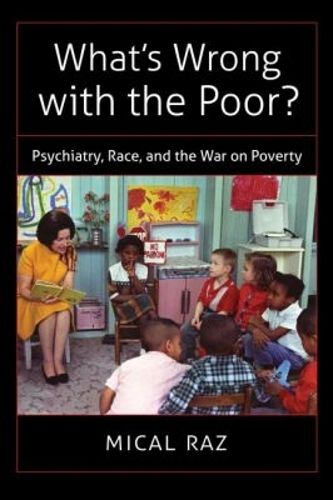Readings Newsletter
Become a Readings Member to make your shopping experience even easier.
Sign in or sign up for free!
You’re not far away from qualifying for FREE standard shipping within Australia
You’ve qualified for FREE standard shipping within Australia
The cart is loading…






In the 1960s, policymakers and mental health experts joined forces to participate in President Lyndon Johnson’s War on Poverty. In her insightful interdisciplinary history, physician and historian Mical Raz examines the interplay between psychiatric theory and social policy throughout that decade, ending with President Richard Nixon’s 1971 veto of a bill that would have provided universal day care. She shows that this cooperation between mental health professionals and policymakers was based on an understanding of what poor men, women, and children lacked. This perception was rooted in psychiatric theories of deprivation focused on two overlapping sections of American society: the poor had less, and African Americans, disproportionately represented among America’s poor, were seen as having practically nothing.
Raz analyzes the political and cultural context that led child mental health experts, educators, and policymakers to embrace this deprivation-based theory and its translation into liberal social policy. Deprivation theory, she shows, continues to haunt social policy today, profoundly shaping how both health professionals and educators view children from low-income and culturally and linguistically diverse homes.
$9.00 standard shipping within Australia
FREE standard shipping within Australia for orders over $100.00
Express & International shipping calculated at checkout
In the 1960s, policymakers and mental health experts joined forces to participate in President Lyndon Johnson’s War on Poverty. In her insightful interdisciplinary history, physician and historian Mical Raz examines the interplay between psychiatric theory and social policy throughout that decade, ending with President Richard Nixon’s 1971 veto of a bill that would have provided universal day care. She shows that this cooperation between mental health professionals and policymakers was based on an understanding of what poor men, women, and children lacked. This perception was rooted in psychiatric theories of deprivation focused on two overlapping sections of American society: the poor had less, and African Americans, disproportionately represented among America’s poor, were seen as having practically nothing.
Raz analyzes the political and cultural context that led child mental health experts, educators, and policymakers to embrace this deprivation-based theory and its translation into liberal social policy. Deprivation theory, she shows, continues to haunt social policy today, profoundly shaping how both health professionals and educators view children from low-income and culturally and linguistically diverse homes.